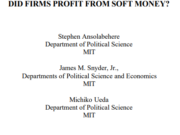Abstract: Popular accounts of interest group influence in the policy process often focus on organizational budgets and campaign contributions, asserting that these resources lead to outcomes that are most preferred by “special” interest groups. Scholarly work that has attempted to assess this influence, however, has come to no set conclusion – sometimes resources lead to influence, sometimes they do not, and sometimes the results are inconclusive. To address the question of whether increased financial resources leads to preferred policy outcomes, we make use of a set of 98 randomly selected U.S. national policy issues about which we have conducted more than 300
interviews and collected extensive secondary source information on more than 1,200 organized interests. Our data include information on a broad range of indicators of financial resources, as well as non-material resources such as governmental allies and group membership. We find that when resources are considered by group type, businesses and other occupational organizations have the clear advantage, especially for material resources. These findings confirm those of numerous previous surveys of interest groups in Washington. When analyzed at the issue level, however, we find that material resources tend to be fairly evenly split on each side of an issue. Poorer citizen groups often cooperate with more well-to-do business and professional organizations, and the citizen groups bring other resources to the table, including membership numbers and public legitimacy. Resource-rich organizations were no more likely than resource-poor organizations to be on the winning side of the policy debate.














